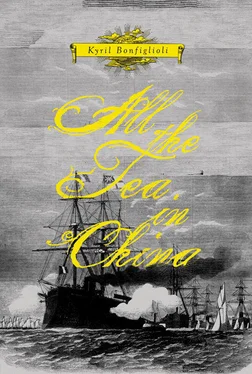Blanche recovered but slowly and was less than eager to receive my caresses, nor would she often meet me at the rail for our twilight talks.
One evening, strolling past the main-mast bitts in search of a cooling breeze, I was accosted by the Irish O’Casey who pointed out to me the beauty of the evening, especially for those fortunate enough to have something to drink in such beauteous circumstances. Desperately lonely, I willingly fetched him a pannikin of what he called “the crater”, which he emptied with many a “God bless yez, Sorr” before commencing to talk.
“ ’Tis a shockin’ tarror of a life dese times, is it not, Sorr?”
“I’m afraid,” I said in a benign but Peter-like voice, “that I cannot discuss the failings of any of my superiors with you. Pray keep the conversation general.”
“Of course, Sorr. I was just t’inking of a Lieutenant I sailed under wance. A great, drunken, red-nosed, rug-headed bastard he was and not a man in the ship but wouldn’t have laughed to see him gibbeted. I t’ink his name was Catt or some such.”
I made a non-committal noise, not wholly discouraging.
“And gibbeted he should have been, too, for didn’t I see him murder three men in front of me own eyes? It was in these very waters, now I call it to mind. He was always a man to carry a press of canvas too long with a freshening wind, as you know.”
I coughed warningly.
“I mean, you might well have come across the kind of a man I’m speaking of, Sorr.”
“Just so.”
“Well it was just one of them occasions; with the wind roaring like the Bull itself and shrieking like the Black Pig, up he sends the foretop men to shorten sail. They lay out along the yard, clinging on for very life, their bare feet clenching on the footropes like canary-birds on a perch, finger-nails torn and bleeding as they fight the bursting canvas — and bursting is the very thing the canvas is likely to do at any moment — while yer lieutenant is dancing on the deck and howling up at the men, calling them idle cowards and names I would be ashamed to hear even in me mother’s mouth. He’s as drunk as the eldest son at a Donegal wake, foaming at the mouth and a black bottle in his hand and at his lips every moment: he’s as full as a Catholic School. Still the men cannot come to grips with the iron-hard canvas, it is as much as they can do to cling to life at all.
“The after-guard are standing by with axes, ready to clear away wreckage if the ship should be dismasted; the Lieutenant snatches an axe and with one mad, drunken blow, severs the sheet — the yard whips round and three top-men are twitched into the raging sea like musket-balls. No question of lowering a boat into that sea; no question of heaving-to, only a question of can the ship live, and every man working away like a dog at a bitch. But murder it was, black murder, and I seen it. I seen it in the Log, too, when I next had duty aft: ‘Sudden storm this day,’ he’d written, ‘the men surly and idle; I obliged to cut sheets to save the ship; three careless seamen drownd through their own inattention.’”
“But the Lieutenent you speak of was a young man then, O’Casey, and foolhardy, rash?”
“It was not dat terrible a lot of years ago, Sorr, and the only difference is that in them days he still had a few marks of the gentleman about him. Today he’s a man that would tear Christ off the Cross.”
“Goodnight, O’Casey,” I said.
Naturally, I did not believe a word of all this, for he was an Irish, as I think I have said, but nevertheless I passed an uncomfortable night.
Strangely, while the men were being worked like slaves as we battered our way against contrary winds through the Island passages, continually making, shortening and furling sail, the sullenness did not seem to increase. It is hard for an exhausted man to brood on mutiny: the hardness of his lot cannot compete with the softness of his pillow. You, whose lot has never been hard, will probably not understand this until my death. (In politeness I must add: “You should live so long.”)
It was later, when we were tearing west and south-west through the Indian Ocean toward the Cape of Good Hope, under all plain sail, that the men, with little to do and some sleep to prompt their appetites, commenced to become seriously surly, to reckon up the hours they spent on deck and to con over and over the little tattered book I had seen circulating, which must, of course, have been the dreaded Seaman’s Friend by the American revolutionary Dana, the arch-sea-lawyer.
When the Captain was sober the men worked just well enough to escape punishment; when he was drunk they gauged his moods to a “T”, idling when they knew it to be safe, hauling away with a “cheerily-ho!” when his eye was upon them and when they were confident that an issue of grog was in the offing.
I knew little of the sea and less of the world at that time but I knew enough to know that this was unwholesome. It seems strange to relate but it is true that, even when I held Blanche in my arms, I found myself wishing that Captain Knatchbull was still alive. (I could not — cannot — forget that moment when I stumbled over his head at the entrance to the Great Cabin and my remembrance that it — the head — was still attached to his trunk by a thick shred of the nape of his neck will never leave me. You may think it a small price to pay, but you have only dealt in money and goods: you have never seen a not-quite-severed head.)
Day followed day; it is impossible to explain to those who have never made a long sea-passage how tediously similar one day in an ocean is to another when the winds are fair, nor could you ever believe how the most trifling incidents can magnify themselves into calamities fit to set an entire ship’s company a-buzz. Let me, simply, say again that the crew became less and less like the jolly Jacks with whom I had set sail from London River, that the Second changed from a taciturn to an utterly silent man, that my dear friend Peter became a stranger who wolfed his food and fell into his bunk with the briefest of “goodnights”, that Orace carried out his duties in a perfunctory and timid way, and that the Captain grew more and more drunken and unpredictable. Sometimes he would not be seen for thirty or forty hours, other times he would rage about the vessel as though determined to make it a floating hell — and an hour later would be clapping every man upon the back, calling him a capital fellow and telling the Bosun to serve out rum to everyone in sight.
Even I could tell that this was no way to command a ship on the high seas.
Retribution came soon and arose from that very vice of Dogg’s which O’Casey had spoken of, taking in sail at a minute after the last minute.
We were running before a fair wind but it was too light for the Captain’s taste and all day long, as he grew drunker and drunker, he sent up more sail until we had staysails alow and aloft, water-sails and save-alls beneath the foot of the topsails; and, high above all, every “kite” that the sail-maker could find or improvise: moon-rakers, a “Jamie Green” or jib-o-jib, even a Yankee-style Jolly Jumper and a “hope-in-heaven”. Peter looked at all this press of canvas gloomily and I recalled his words when we first met: that the John Coram was built for spread, not hoist.
The Second had the watch; Peter and I were walking the deck in silence. The wind began to freshen and to shift a point here and then a point there. On the horizon there were tropical squalls plain to be seen, like dark-grey tree-trunks joining sea and sky. I noticed, with some uneasiness, that the watch on deck were all gazing aloft, where the extra masts looked no thicker than cabmen’s whips — and were behaving like them.
Читать дальше












